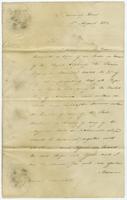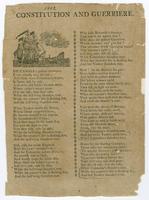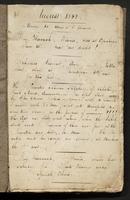At Sea 1812
Blockade -- Constitution v. Guerriere
The fall of 1812 saw the beginning of British efforts to establish a blockade along parts of the Atlantic coast of North America, from Charleston, South Carolina, to Spanish Florida. The only significant American military success in 1812 occurred at sea, though its significance was less strategic and more important for U.S. morale. U.S. frigate Constitution was cruising several hundred miles off the coast of Newfoundland, looking for British ships rumored to be in the vicinity of the Maritime Provinces, when it encountered the British frigate Guerrière. The two ships fought for three hours until an American broadside destroyed or disabled two of the Guerrière’ s masts. The Constitution, nicknamed “Old Ironsides”, escaped with minor damage, but the British ship was so badly damaged that after its captain and crew surrendered, U.S. Captain Isaac Hull had the ship burned rather than bring into port as a prize. Captain Hull, nephew of the disgraced William Hull, returned to Boston a hero. He was lauded for achieving the first major victory over Britain through expert leadership and artful seamanship at the head of a exceptional vessel (even if its sides were not made of iron).
Related Items

Order in Council ordering a blockade
Henry Bathurst to Lieutenant General Colin Campbell. August 1, 1812.
A letter from Henry, Earl Bathurst, Secretary of War and the Colonies, accompanies a copy of the Order-in-Council announcing the blockade. It orders “that a general Embargo or Stop be made of all ships and vessels whatsoever belonging to the citizens of the United States of America now within or which shall hereafter come into any of the Ports, Harbours or Roads within any part of His Majesty’s Dominion together with all Persons and Effects on board such Ships and vessels…” Campbell would have received this order while lieutenant-governor or Gibraltar.

Constitution and Guerrière
Constitution and Guerriere. Boston: Nathaniel Coverly, jun., between 1812 and 1815.
This broadside poem, printed some time during the war, celebrates the Constitution’s victory in patriotic verse that paints both sides as gallant adversaries: “When Yankee meets the Briton, / Whose blood congenial flows,/ By heaven created to be friends, / By fortune rendered foes.” A small woodcut depicts both the ships. The small image of the destroyed Guerrière is particularly poignant.

Diary of a sea-faring man
Journal, August 10 to September 22, 1812
The author of this journal is unknown but his attention to the weather, naval matters and other evidence indicate that he may have been a nautical man living near Newburyport, Massachusetts. The journal gives a great deal of information on privateers and contains a lively description of the action between the Constitution and Guerrière: “The brilliancy of this action, however we may regret the occasion that has produced it, will still excite the liveliest emotions in every American bosom” (image 62).


